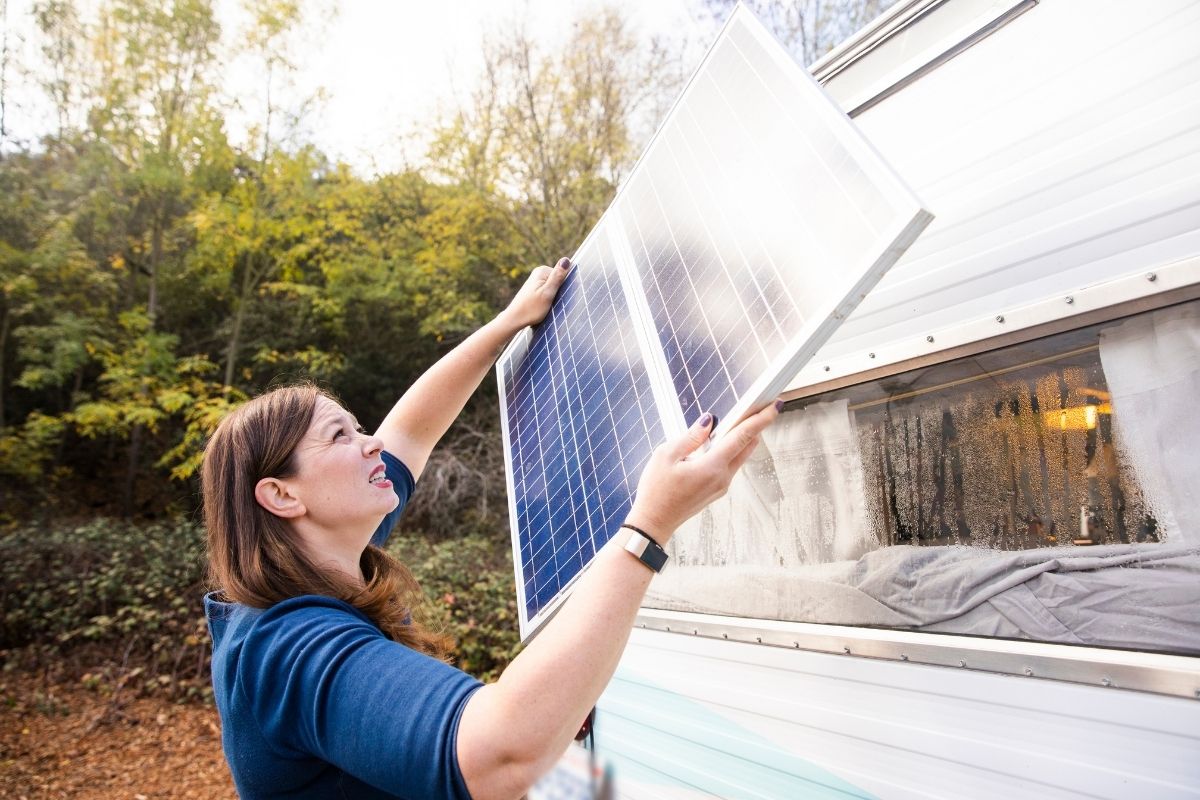Discover How To Use The Power of Authority Marketing To Make You Money While You Adventure!
No Experience, Existing Product Or Technical Skills Are Required
DO YOU BELIEVE ADVENTURES ARE WORTH CHASING?
We're an affiliate.
We hope you love the products/services we recommend on Just Van Life! So you know, there is the possibility we will collect a commission should you make a purchase via any of our links. This will in no way affect the purchase price. Thank you for your support, we really appreciate it!
Solar power is a much-needed power source in this day and age due to its environmentally friendly nature.
Solar power is not only an excellent choice for everyday use, it is also the perfect solution for those who want to travel in their RV but don’t want to be tied down by a not so eco-friendly electrical hookup.
With this in mind, we are going to be taking a look at how to go about charging your RV with solar power, what exactly solar power is, and how much solar power you will need to completely charge your RV.
Let’s get started.
What Is Solar Power?
Solar power is the process of converting sunlight into electricity using photovoltaic cells.
The energy from the sun is converted into direct current (DC) which can then be used to run any electronic device that uses DC as a form of power supply.
This includes most appliances such as lights, fans, refrigerators, air conditioners, computers, televisions, cell phones, etc.
In order to convert light into electricity, photovoltaic cells require two things: A medium through which light can pass and photons.
How To Use Solar Power With An RV?
There are many different ways to use solar power on an RV.
Some people like to take advantage of the natural daylight available during daytime hours, while others prefer to use solar panels when they are parked overnight or for long periods of time.
Either way works just fine.
However, if you are planning on staying somewhere for a few days or more than a week, we recommend that you install some type of battery backup system.
If you plan on using solar power during the day, you should have enough batteries to store all the excess energy produced during the day. If you plan on having solar power at night, you should definitely invest in a battery backup system.
The best thing about solar power is that there are no wires involved, making it a very clean and green option. It does require maintenance, though, so make sure you keep your solar panels well maintained.
You may even want to consider adding a battery backup system to ensure that you always have access to power
How Much Solar Power Do You Need For An RV?
This really depends on where you are going to be using your RV. If you are going to be camping out in one location for a few days, you probably won’t need too much solar power.
However, if you are going to be traveling across the country or around the world, you might want to think about investing in a larger amount of solar power.
The size of your RV will also change the amount of solar power that you will need.
Here is a look at some of the sizes of solar panels you can get that are suitable for an RV:
- Small RV – 10-Watt Solar Panel
- Medium RV – 25-Watt Solar Panel
- Large RV – 50-Watt Solar Panel
- Extra Large RV – 100-Watt Solar Panel
If you are looking to go off-grid and live solely off of solar power in your RV, you will want to purchase a larger solar panel such as the ones listed above.
This solar panel technology is designed specifically for RV applications and is able to produce a lot of power. They are not only ideal for powering your RV but also other, larger applications such as an air conditioner, refrigerator, computer, TV, etc.
If you are interested in using solar power to charge your RV battery, you will want to choose a smaller solar panel. These panels are perfect for charging small amounts of batteries.
They are also great for charging devices that don’t consume a lot of power such as laptops, tablets, smartphones, cameras, GPS units, etc.
The Best Way To Charge Your RV With Solar Power
When it comes to picking the right solar panel to fit your needs, there are several factors that you must take into consideration.

First off, you need to know how much power you need to charge your RV. There are three main types of solar panels that you can choose from.
These include:
Fixed Panels
These panels are installed permanently and cannot be moved. They are great for those who want to stay put for extended periods of time because they do not require any moving parts.
However, these panels are usually quite expensive.
Portable Panels
These panels can be easily removed and placed anywhere you would like them to go. They are typically smaller than fixed panels and are ideal for those who want to move around frequently.
Unfortunately, portable panels tend to be less efficient than fixed panels.
Hybrid Panels
These panels combine the benefits of both fixed and portable panels.
They are designed to be easy to transport and can be placed almost anywhere. However, they also come with their own set of drawbacks.
Another important factor to consider is where you will place your solar panels.
If you plan on installing them outside your RV, you should look for a location that gets plenty of sunshine throughout the year.
You should also try to avoid areas that get too much shade. Shade causes the temperature inside your RV to drop significantly, thus reducing the amount of power generated by your panels.
The size of your solar panels is also an essential factor to be considered. The larger your panels, the more power you can generate.
However, large panels are often heavy and difficult to handle. Smaller panels are easier to manage, but produce less power. In general, you should look for panels that weigh no more than 50 pounds each.
Finally, you should make sure to check out all the different options available when purchasing a solar panel.
Each brand has its own unique features and benefits, some of which might be more suitable for your RV- and how you chose to apply the solar panel- than others. It is always best to research each option before making your final decision.
Installing Solar Panels On Your RV
Once you have decided which type of solar panel you would like to use, you will then need to figure out where you will install them.
Installing your solar panels on top of your roof or on the side of your RV will allow you to maximize your energy production.
This is especially true if you live in a dry climate. In this case, you may want to opt for panels that are mounted directly onto the roof.
If you decide to mount your panels on the side of your vehicle, you will need to ensure that you have enough space to accommodate them.
Some manufacturers recommend placing your panels at least 10 feet away from the wall of your RV. This will help prevent damage to your panel as well as reduce the risk of overheating.
If you are planning on using a hybrid panel, you will need to find a way to connect them to your existing electrical system.
Most RV owners use 12-volt systems, so you will probably need to purchase a converter. This device converts the voltage from 120 volts to 12 volts.
You will also need to determine how many batteries you will need to store the excess electricity produced by your panels.
Typically, most RV owners run their appliances off of two deep-cycle batteries. This allows them to keep their RV running even during times of low battery power.
You should also think about what kind of inverter you will need to convert DC into AC. In terms of solar panels, an inverter is essentially a transformer.
It takes the direct current (DC) from the panels and turns it into alternating current (AC). This process helps to regulate the flow of electricity through wiring.
When choosing an inverter, you will want to make sure that it matches up with the output of your panels. This means that you will need one that produces the same number of amps as your panels do.
Additionally, you will want to choose an inverter that provides a constant frequency of 60 Hz.
If you plan on using your RV’s air conditioner, you will need to make sure that you get an inverter that supports this feature.
In order to maximize the amount of energy you can generate, you will need to take advantage of any natural light sources around your RV. You can either place your panels outside or inside your RV.
The latter option is usually preferable because it will provide you with more sunlight throughout the day. However, you will still need to consider whether, or not, installing your panels inside will cause too much heat.
Many RV owners choose to go with a standard inverter because it is simple to operate and inexpensive.
However, there are other types of inverters that are specifically designed to work with solar panels.
These include:
A Microinverter
This type of inverter is small and lightweight. They are ideal for RVs that travel frequently.
An Array Inverter
This type of unit is designed to be used in conjunction with multiple solar panels.
A String Inverter
This type uses a series of strings that contain several inverters. Each string has its own controller that regulates the flow of electricity.
To make sure that you select the right inverter for the solar powers on your RV, you will need to research different models.
This includes looking at reviews online, as well as asking friends who have installed similar units. Once you know which model works best, you can then compare prices from various retailers.
Solar Panel Installation Tips
When installing your solar panels, there are several things you should keep in mind, including:
- Cover up any wiring that might be exposed.
- Make sure to secure your panels properly.
- Do not cover the entire surface area of your RV with panels.
- Use weatherproof materials to protect against rain and snow.
- Check your local building codes to see whether you need permits to install your panels.
- Keep your panels clean.
- Consider mounting your panels on the roof or sides of your RV.
- Investigate the different types of panels available.
- Ensure that you have enough room to place your panels safely.
- Select a location that receives direct sunlight throughout the day.
- Install your panels correctly.
- Inspect your panels regularly.
Final Thoughts
The amount of solar power that you will need to run your RV depends entirely upon what kind of lifestyle you lead.
If you travel frequently or spend long periods of time away from home, then you will likely need a lot of power.
On the other hand, if you only use your RV occasionally and live near a source of electricity, then you may only need enough power to keep things running while you are gone.
Thanks for reading!
Discover How To Use The Power of Authority Marketing To Make You Money While You Adventure!
No Experience, Existing Product Or Technical Skills Are Required
DO YOU BELIEVE ADVENTURES ARE WORTH CHASING?
